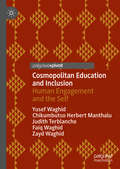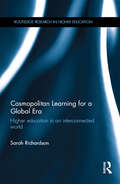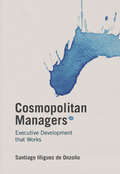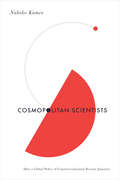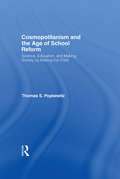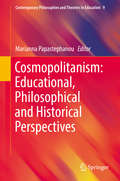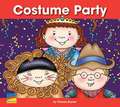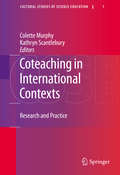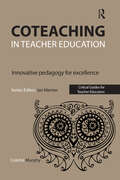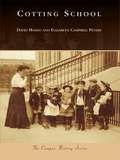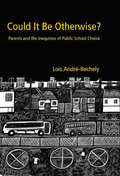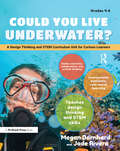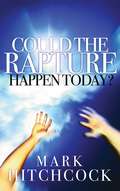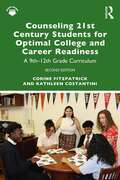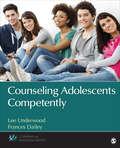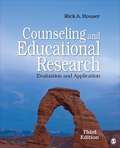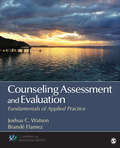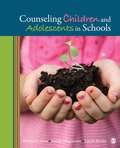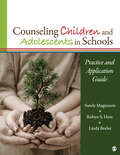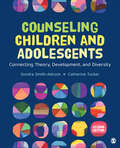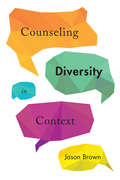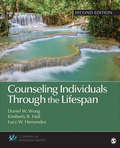- Table View
- List View
Cosmopolitan Education and Inclusion: Human Engagement and the Self
by Yusef Waghid Faiq Waghid Zayd Waghid Chikumbutso Herbert Manthalu Judith TerblancheThis book expands understanding of cosmopolitan education that has the potentialto cultivate deliberative pedagogical encounters in universities. The authorsargue that cosmopolitan education in itself is an act of engaging with strangeness,otherness, difference and inclusion/exclusion. What follows is the engenderingof inclusive human encounters in which freedom and rationality – guidedby co-operative, co-existential and oppositional acts of resistance – can be exercised.The chapters centre around the enactment of universal hospitality, unconditionalengagement, difference, intercultural learning, democratic justice andopenness to develop a robust and reflexive defence of cosmopolitan education.This book will appeal to scholars of cosmopolitan education as well as democraticand inclusive education.
Cosmopolitan Learning for a Global Era: Higher education in an interconnected world (Routledge Research in Higher Education)
by Sarah RichardsonEnsuring that higher education students are fully prepared for lives as global citizens is a pressing concern in the contemporary world. This book draws on insights from cosmopolitan thought to identify how people from different backgrounds can find common ground. By applying cosmopolitan insights to higher education practice, Sarah Richardson charts how students can be given the opportunity to experience a truly international education, which emphasises deep cultural exchange rather than mere transactional contact. Written in an engaging and accessible style, the author uses empirical evidence to show that simply studying alongside those different to themselves or studying overseas are inadequate in preparing students to lead the diverse societies of tomorrow. Instead, the book calls for a coherent approach to higher education that properly prepares students to lead global lives. Chapters highlight a number of key aspects of higher education practice, from curriculum to pedagogy, to educator skills to assessment, and demonstrate how these can be reconsidered to give students the opportunity to gain cosmopolitan attributes during their higher education. Cosmopolitan Learning for a Global Era will be of great interest to researchers, scholars and postgraduate students, with a particular focus on cosmopolitan thought, international education and higher education more broadly, as well as university educators and leaders across a wide range of disciplinary areas.
Cosmopolitan Managers: Executive Development that Works (IE Business Publishing)
by Santiago Iñiguez de OnzoñoExecutive education is a billion dollar industry that has the potential to transform individual and organizational performance, but in too many cases the decision whether or not to lavish it upon any given manager comes down to whether the fear that they will leave if you don't spend money on them is greater than the fear that they will leave if you do. Given that the future of your business, or your career, depends on developing your managerial talent to its fullest potential isn't it time we took a serious look at how do you design and deliver an executive education program that is fit for purpose? Santiago Iñiguez is Dean of the prestigious IE Business School in Madrid - one of the world's leading providers of executive education. From the impact of MOOCs to the evolution of new multi-dimensional strategic alliances between companies and a diverse range of international education suppliers, institutions, and consultancies, Iñiguez looks at how the future of executive education is changing to meet the needs and wants of top managerial talent. Part of the solution, Iñiguez argues, is to balance the technical, analysis-based "engineering" training that forms the basis of many senior managers' initial study, with a more rounded, integrated approach that includes learning derived from the humanities, such as art and history. Illustrated with fascinating examples drawn from interviews with some of the most influential figures in business education and corporate training around the World, Iñiguez's book delivers a unique perspective and valuable insights on what it takes to deliver world-class corporate training.
Cosmopolitan Scientists: How a Global Policy of Commercialization Became Japanese (Culture and Economic Life)
by Nahoko KameoAs the university transformed itself into a center of innovation, and biotechnology became a billion-dollar industry, commercialization of university inventions became both lucrative and urgent. In the United States, this shift decisively converted the academic scientist into an entrepreneur. From there, legal structures that facilitated university scientists' patenting and commercialization spread across the world, including to Japan, where earlier modes of doing science made such diffusion more difficult—and more interesting. Cosmopolitan Scientists delineates what happens when global policies diffuse to different cultural and institutional contexts. Instead of simply accepting or resisting the change, Japanese university scientists creatively enacted the new rules, making unique local variations of the global policy—and thus making it Japanese. Drawing on vivid accounts from bioscientists who experienced and enacted the shift toward commercialization, the book offers an insider's view into the way scientists navigate the complex and shifting landscape of science, innovation, and economic policy. In so doing it also tells a broader story of how the global rules can be successfully "naturalized"—modified, settled down, and made local.
Cosmopolitanism and the Age of School Reform: Science, Education, and Making Society by Making the Child
by Thomas S. PopkewitzIn Cosmopolitanism and the Age of School Reform, noted educationalist Thomas Popkewitz explores turn-of-the-century and contemporary pedagogical reforms while illuminating their complex relation to cosmopolitanism. Popkewitz highlights how policies that include "all children" and leave "no child behind" are rooted in a philosophy of cosmopolitanism—not just in salvation themes of human agency, freedom, and empowerment, but also in the processes of abjection and the differentiation of the disadvantaged, urban, and child left behind as "Other."
Cosmopolitanism: Educational, Philosophical and Historical Perspectives (Contemporary Philosophies and Theories in Education #9)
by Marianna PapastephanouThis volume discusses perspectives on cosmopolitanism, as well as concepts and the work of key figures. For example, it examines educational, philosophical and historical perspectives, deals with such issues as citizenship, internationalism, patriotism, globalization, hegemony and many other topics. It brings together works on Alain Badiou, Giorgio Agamben, Ernesto Laclau, Bruno Latour and Homi Bhabha with works on Whitman, Kant, Martha Nussbaum, Thomas Pogge, Onora O'Neill and Philippe Van Parijs. The book engages in the new dialogue on cosmopolitanism from a variety of outlooks. It advances that dialogue and problematizes it through as yet unexplored paths. Its chapters respond to the intricacies of current discourses on cosmopolitanism and related notions and take into account both affirmative and negative stances to cosmopolitanism and its educational significance. Overall, the book relies on such stances as background material in order to transcend them and offer fresh perspectives on cosmopolitan stakes. It makes use of a recent tendency in political philosophical and cultural-critical debates that opens a possibility of more nuanced approaches to old '-isms'.
Coteaching in International Contexts: Research and Practice (Cultural Studies of Science Education #1)
by Kathryn Scantlebury Colette MurphyCoteaching is two or more teachers teaching together, sharing responsibility for meeting the learning needs of students and, at the same time, learning from each other. Working as collaborators on every aspect of instruction, coteachers plan, teach and evaluate lessons together. Over the past decade, because coteaching can be highly beneficial to both students and teachers it has become an increasingly important element of science teacher education and is expanding into other content areas and educational settings. This edited book brings together ten years' work on the research and the practice of coteaching and its impact on teaching and learning, predominantly in the sciences. It includes contributions from Europe, United States and Australia and presents an doverview of theory and practice common to most studies.
Coteaching in Teacher Education: Innovative Pedagogy for Excellence (Critical Guides for Teacher Educators)
by Colette MurphyThis book provides a concise and comprehensive overview of the practice of coteaching, including its benefits and educational and social implications. Coteaching plays an important role in enhancing the experience and effectiveness of pre-service and in-service teachers during school experience at a time when teacher retention rates are a concern both nationally and internationally. Traditional practice in school experience, generally comprising observation followed by complete take-over of classes, has not altered in more than a century, despite significant changes in the role of the teacher, the needs of students, the learning environment and the functioning of schools. Coteaching provides a pedagogy which supports pre-service teachers more actively and promotes teacher professional development, as they work together in co-planning, co-practice and co-evaluating lessons during school-based experience. Co-teaching in Teacher Education is part of the successful Critical Guides for Teacher Educators series edited by Ian Menter.
Cotting School (Campus History)
by Elizabeth Campbell Peters David ManzoIn 1893, two pioneering orthopedic surgeons, Dr. Augustus Thorndike and Dr. Edward Bradford, saw the need to educate children whose physical challenges prevented them from attending school. As an experiment, they founded the Industrial School for Crippled and Deformed Children in Boston. Modeled after 19th-century European institutions, the school was America's first for children with physical disabilities. Early classes were held in a church basement where Mary Perry volunteered to teach seven students. Tuition, a hot meal, and transportation in a horse-drawn carriage were free. Thanks to the leadership of the two doctors and board chairman Francis Joy Cotting, within 10 years the school was housed in an impressive, debt-free brick building. Renamed the Cotting School, the school is now located in Lexington and serves 130 day students from 74 communities. Staffed with highly skilled special education teachers; nurses; physical, occupational, and communication therapists; and dental and vision specialists, Cotting is a national leader in serving children with a broad spectrum of learning and communication disabilities, physical challenges, and complex medical conditions.
Could It Be Otherwise?: Parents and the Inequalities of Public School Choice (Critical Social Thought)
by Lois André-BechelyParents who wish to choose schools for their children must have more than a desire for different or better - they need detailed knowledge of the processes and practices that will give them access to schools of choice. This book vividly contrasts the experiences of a diverse group of urban parents choosing their children's schools with school choice policies from voluntary integration mandates to the No Child Left Behind Act. Lois André-Bechely carefully uncovers the race- and class-based inequities these policies sustain, documenting the way parents themselves become complicit in the historical inequalities of schooling. This book exposes how educational institutions are making this so and provokes new thinking about how public school choice could be implemented in more equitable and democratic ways.
Could You Live Underwater?: A Design Thinking and STEM Curriculum Unit for Curious Learners (Grades 4-5)
by Megan Barnhard Jade RiveraIn this engaging design thinking adventure, students utilize STEM skills and creative thinking to research, design, and build prototypes of the underwater house of the future! After researching the effects of climate change on people throughout the world, learners narrow their focus to tackle an aspect of designing underwater that grabs their imaginations. They utilize design thinking to ideate, prototype, and test, conducting experiments along the way and applying their findings about the properties of water to their work. The unit includes six modules with flexible time constraints, meaning teachers can implement the unit in as little as six class periods or as many as 6 weeks. At every stage, learners draw on creativity and collaboration as they build STEM skills. Packed with engaging projects, experiments, and opportunities to reflect, Could You Live Underwater?: A Design Thinking and STEM Curriculum Unit for Curious Learners invites students to engage with issues they care about while building the skills they need for the future.Grades 4-5
Could the Rapture Happen Today?
by Mark HitchcockGet Caught Up in the Rapture! Religious jargon aside, just what is the rapture? Why is it such a big deal among Christians today? Here are the answers. Could the Rapture Happen Today?clearly defines this event and tackles the most commonly asked questions surrounding it. With solid evidence backing his responses, Mark Hitchcock also boldly explores the most controversial and pressing question, When will it happen? With biblically sound, detailed arguments supporting the belief that the rapture will occur prior to the tribulation (pre-trib), Hitchcock tackles the question from every angle. Your nagging questions relieved, this fascinating page-turner will still leave you on the edge of your seat, anticipating Christ's return at any unexpected moment! WRAPPED UP IN THE RAPTURE Pre-Trib Mid-Trib Post-Trib Say what? Scholars debate and theses are written, but you simply want to know,Just what is the Rapture?and,When might it occur?Or maybe you're wondering how the Rapture differs from Christ's return, or whether the destinies of the unsaved can change during the horrifying years of the Great Tribulation. Prophecy expert Mark Hitchcock tackles your most common questions from every angle. Because-while the exact day and hour cannot be forecasted-biblically sound, detailed arguments state the case for the Rapture occurring prior to the Tribulation. Get the clear answers you need and move boldly forward with peace of mind. Story Behind the Book "The one biblical truth that has affected my Christian life more than any other is the rapture of the church-the belief that Jesus could come at any moment to take His people away to be with Him. It deeply affects how I view my life, this world, and how I live each day. I have always wanted to write a book that clearly explains the truth of the any-moment rapture and how it should affect our daily lives. I'm grateful that the good people at Multnomah have given me the opportunity to share my passion for this blessed hope with others. " - Mark Hitchcock From the Trade Paperback edition.
Counseling 21st Century Students for Optimal College and Career Readiness: A 9th–12th Grade Curriculum
by Corine Fitzpatrick Kathleen CostantiniThis second edition presents an updated action-based curriculum for high school counselors that will meet the needs of 21st century students, helping to foster their growth and engage them in learning what they need to succeed beyond high school. This book takes a comprehensive, developmental approach, focusing on 9th-12th grade students rather than solely on those in 11th and 12th grade. It provides a model for developing and enhancing a successful college advising office as well as essential advice on methods of working with parents. Specific topics discussed include successful transition to 9th grade, using technology in the college and career advising process, assisting and advising students in college research and application, and helping seniors make successful transitions to college. There is also a special focus on students in urban and rural schools to enable them to have the same enriched experiences in their college and career advising program as those students in private and suburban schools. The curriculum is geared for use by school counselors, college advisors, and readers in graduate counseling student courses.
Counseling Adolescents Competently (Counseling and Professional Identity)
by Frances L. Dailey Lee Anthony Underwood"This is a text that is long overdue, I am excited to see such talented and experienced counselors come together to write such an informative updated text on counseling today’s adolescents." –Jennifer Jordan, Winthrop University Counseling Adolescents Competently is a comprehensive text for students and professionals compiling foundational and emerging skills in the counseling field. Authors Lee Underwood and Frances Dailey review extensive interventions ranging from assessment to diagnosis as well as fresh perspectives on working with this often challenging group. Employing clinical case scenarios and profiles that demonstrate key issues, this book helps the counselor-in-training to understand the relevant theories and research around adolescents to better engage in culturally relevant interventions and treatment planning.
Counseling Adolescents Competently (Counseling and Professional Identity)
by Frances L. Dailey Lee Anthony Underwood"This is a text that is long overdue, I am excited to see such talented and experienced counselors come together to write such an informative updated text on counseling today’s adolescents." –Jennifer Jordan, Winthrop University Counseling Adolescents Competently is a comprehensive text for students and professionals compiling foundational and emerging skills in the counseling field. Authors Lee Underwood and Frances Dailey review extensive interventions ranging from assessment to diagnosis as well as fresh perspectives on working with this often challenging group. Employing clinical case scenarios and profiles that demonstrate key issues, this book helps the counselor-in-training to understand the relevant theories and research around adolescents to better engage in culturally relevant interventions and treatment planning.
Counseling And Educational Research: Evaluation And Application, 3rd Edition
by Rick A. HouserThe Third Edition of Counseling and Educational Research: Evaluation and Application emphasizes the importance of being a good consumer of research and teaches readers how to conduct research in practice. Written in an engaging, conversational tone, the book uses concrete examples from professional literature to demonstrate how to effectively evaluate and interpret research articles--without relying on discipline-specific jargon. The Third Edition features new examples, updated research, a new chapter on single-subject research, a new chapter on the use of technology and research, and much more.
Counseling Assessment and Evaluation: Fundamentals of Applied Practice (Counseling and Professional Identity)
by Brande Flamez Joshua WatsonDesigned to help students learn how to assess clients, conduct treatment planning, and evaluate client outcomes, this practical book addresses specific CACREP competencies. Incorporating case studies and examples, authors Joshua C. Watson and Brandé Flamez provide foundational knowledge for sound formal and informal assessments, cover ethical and legal considerations in assessment, describe basic statistical concepts, highlight the domains in which assessments are commonly used (intelligence, aptitude, achievement, personality, career, etc.), and provide strategies for integrating assessment data when working with clients. Counseling Assessment and Evaluation is part of the SAGE Counseling and Professional Identity Series, which targets specific competencies identified by CACREP (Council for Accreditation of Counseling and Related Programs).
Counseling Assessment and Evaluation: Fundamentals of Applied Practice (Counseling and Professional Identity)
by Brande Flamez Joshua WatsonDesigned to help students learn how to assess clients, conduct treatment planning, and evaluate client outcomes, this practical book addresses specific CACREP competencies. Incorporating case studies and examples, authors Joshua C. Watson and Brandé Flamez provide foundational knowledge for sound formal and informal assessments, cover ethical and legal considerations in assessment, describe basic statistical concepts, highlight the domains in which assessments are commonly used (intelligence, aptitude, achievement, personality, career, etc.), and provide strategies for integrating assessment data when working with clients. Counseling Assessment and Evaluation is part of the SAGE Counseling and Professional Identity Series, which targets specific competencies identified by CACREP (Council for Accreditation of Counseling and Related Programs).
Counseling Children and Adolescents in Schools
by Linda Beeler Sandy Magnuson Robyn S. HessCounseling Children and Adolescents in Schools is a text and practice and application guide designed to help aspiring school psychologists and counselors gain the necessary theoretical background and skill set to work effectively with youth in schools. The dual focus on school counselors and school psychologists provides students a broader view of the different mental health professionals in the schools, with an emphasis on collaboration. This interdisciplinary text can be used across pre-practica, practica, and other school-based field experiences.
Counseling Children and Adolescents in Schools: Practice and Application Guide
by Sandy Magnuson Robyn S. Hess Linda M. BeelerCounseling Children and Adolescents in Schools: Practice and Application Guide is an accompaniment to Hess, Magnuson, and Beeler′s Counseling Children and Adolescents in Schools. Collectively, the set is designed to help aspiring school psychologists and counselors gain the necessary theoretical background and skill set to work effectively with youth in schools. The dual focus on school counselors and school psychologists provides students a broader view of the different mental health professionals in the schools, emphasizing on collaboration. This interdisciplinary set can be used across pre-practica, practica, and other school-based field experiences.The corresponding textbook, Counseling Children and Adolescents in Schools (978-1-4129-9087-5), is designed for use in conjunction with the Practice and Application Guide. The textbook offers detailed vignettes, tip boxes, activities, and guided reflections to help students develop a more accurate and realistic expectation of school settings. Additionally, a unique and comprehensive chapter on crisis response includes topics from planning through practice. Order the text and the Practice and Application Guide together using ISBN 978-1-4522-1680-5.
Counseling Children and Adolescents: Connecting Theory, Development, and Diversity (Counseling and Professional Identity)
by Mary Catherine Tucker Sondra L. Smith-AdcockCounseling Children and Adolescents, Second Edition reviews the most relevant theoretical approaches for counseling children (CBT, emotion focused therapy, play therapy, systems theory and developmental theories) and focuses on connecting key theories to application via case studies. The book has an integrated framework that focuses on development and diversity. In addition, a unique aspect of this text is its focus on neuroscience, the developing brain, and the impact of early childhood trauma on development. Updates to the second edition include new coverage of the multicultural ethical decision model, intersectionality, implicit bias, the impact of the COVID-19 pandemic, and new research and citations.
Counseling Children and Adolescents: Connecting Theory, Development, and Diversity (Counseling and Professional Identity)
by Mary Catherine Tucker Sondra L. Smith-AdcockCounseling Children and Adolescents, Second Edition reviews the most relevant theoretical approaches for counseling children (CBT, emotion focused therapy, play therapy, systems theory and developmental theories) and focuses on connecting key theories to application via case studies. The book has an integrated framework that focuses on development and diversity. In addition, a unique aspect of this text is its focus on neuroscience, the developing brain, and the impact of early childhood trauma on development. Updates to the second edition include new coverage of the multicultural ethical decision model, intersectionality, implicit bias, the impact of the COVID-19 pandemic, and new research and citations.
Counseling Diversity in Context
by Jason BrownWellness is an important goal of counseling work, but the limits of promoting it are reached more quickly for individuals living in disadvantaged circumstances. How then can counselors be effective in a context that produces and reproduces structural inequality? In Counseling Diversity in Context, Jason Brown addresses this question, exploring the possibilities and limitations of counseling, as well as the forces that help and hinder communities, while demonstrating the need for alternatives to mainstream psychological approaches. Divided into two parts, the book provides a structural understanding of the context in which cross-cultural counseling takes place, and a model, informed by intersectional analysis, to support counselors in playing a more activist role in helping to change that context. Brown encourages counselors to not only understand the social problems that contribute to personal challenges faced by clients but to also raise awareness and promote change.
Counseling Individuals Through the Lifespan (Counseling and Professional Identity)
by Kimberly R. Hall Daniel W. Wong Lucy Wong HernandezOrganized around the 2016 Council for Accreditation of Counseling and Related Educational Programs (CACREP) Standards, Counseling Individuals Through the Lifespan introduces readers to the fundamentals of the counseling process during each stage of human development. Topics such as the client-counselor relationship, counseling theory, research, and interventions are addressed with a focus on caring for the total person within their environment and culture in today’s diverse world. Emphasizing the importance of self-reflection, chapters include case illustrations and guided practice exercises to further the development of successful, ethical 21st century counselors. Included with this title: The password-protected Instructor Resource Site (formally known as SAGE Edge) offers access to all text-specific resources, including a test bank and editable, chapter-specific PowerPoint® slides.
